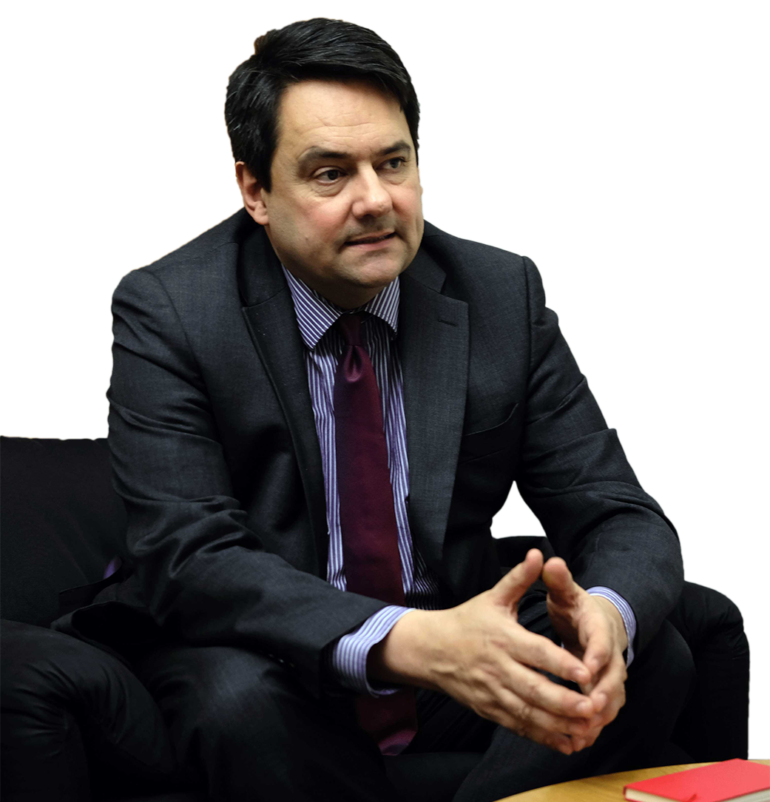Access to quality education remains “crucially important” for the world’s poorest children and the UK must continue to prioritise getting the poorest children into school, Stephen Twigg said.
He expressed his own scepticism about the effectiveness of low-fee schools and said there were concerns they were excluding children from the poorest families.
He also highlighted work being done to help refugee children in Jordan and Lebanon, which he and his committee saw at first hand on a recent visit.
As Chair of the House of Commons International Development Select Committee, Stephen Twigg is a prominent figure when it comes to scrutinising the UK’s aid spending.
His committee is currently holding an inquiry into the Department for International Development’s (DFID’s) work on education around the world, Leaving no one behind, which the NASUWT has submitted evidence to.
The inquiry is taking place in a climate of declining spending globally on education from bilateral and multilateral donors.
In an interview at his office in Westminster, Mr Twigg spoke about the challenges of securing access to quality primary education for children around the world and particularly the 59 million who are not in school.
He said: “I think it is very important for DFID and for the UK Government as a whole, and other countries, to retain that priority whilst also increasing focus on secondary and tertiary education. Crucially, there is the question of quality alongside the access.
“We want, of course, primary-age children to be at school. We then want that to be a quality education for them.”
Mr Twigg was speaking following the publication of a report by Education International (EI) into the activities of Bridge International Academies (BIA) which was critical of the group and its operation of low-fee schools in Kenya.
"I believe there is a big job of work to be done to support the development of strong systems of education in the poorest countries. My instinct is very much that school education is something that should be provided free of charge.”
The Committee is currently taking evidence on the issue of low-fee schools and Mr Twigg said it would be addressed in its report later this year. The report by EI “raises a whole series of questions which we will certainly be considering”, he said.
But he stressed that when his committee visited a BIA school in Lagos, Nigeria, they had been “impressed” with what they saw.
However, he added: “My instinct is sceptical about the focus on low-fee schools. I believe there is a big job of work to be done to support the development of strong systems of education in the poorest countries. My instinct is very much that school education is something that should be provided free of charge.

Mr Twigg was more cautious when it came to commenting on the current difficulties at the Department for International Development (DFID) which have seen hostile media reports on what is perceived as wasteful spending on various aid projects.
DFID currently spends 7.7% of its overall budget on education which is less than the spending on government and civil society (8%), disasters (9%) and health (12.5%).
Some in the development community fear the International Development Secretary Priti Patel is preparing the ground for a radical reduction in DFID’s work and some of the media stories will help this. "Whenever those allegations are brought to our attention, we as a committee take that very seriously.”
Asked if he thought that some of the recent media reports on waste were part of this agenda, he said: “My view is absolutely that those of us that support international aid and development should be the first to speak out for value for money and against waste.
He recalled the recent visit by his committee to Jordan and Lebanon, two countries which have had to cope with an enormous influx of refugees from the conflict in Syria.
The two countries have absorbed more than two million displaced people and have done so with “remarkable hospitality”.
The NASUWT is doing “brilliant work” in terms of its international solidarity with other countries and trade unions around the world, Stephen Twigg said.
He said the role of unions like the NASUWT was vital in supporting education internationally but also in ensuring that the SDGs are implemented domestically as well.
He said: “I know the NASUWT does brilliant work in terms of its international solidarity; how it shows solidarity with people in other parts of the world.”
He added that, following a tumultuous year politically with the election of Donald Trump, the vote for Brexit and the rise of populism in Europe, an international outlook was vital.
He said: “The trade union movement has always had internationalism as one of its guiding principles. “Never have we needed that light of internationalism to be shone more than today.”
“One of the most moving things was to see the children’s playground that had been built and the football pitch that had been created, to see children being children with everything they had been through.”
He praised the use of Double Shift schools in the two countries and how in Jordan, while domestic laws do not allow non-Jordanians to teach, Syrian teachers were supporting their Jordanian colleagues by working as teaching assistants.
He further contrasted the way the countries had absorbed so many displaced people with the debates around refugees and immigration in Europe and the UK: “We have debates in this country about taking 20,000 refugees in a country of 65 million and you have a small country like Lebanon or Jordan that have each absorbed more than one million refugees and they have risen to the challenge and shown remarkable hospitality.
“We can be proud of the fact that the UK is playing a role in the region, but it certainly puts things into perspective.”




